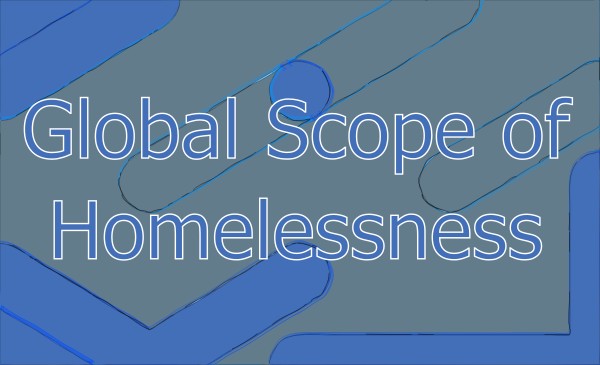Home page | Generative Images Collection | Blog Entries

Global Scope of Homelessness
Published on 01 January 2024 by Juan-S.
Homelessness is a pervasive and complex issue affecting millions of people worldwide. It transcends geographic, economic, and cultural boundaries, presenting a significant challenge for societies across the globe. The causes of homelessness vary from country to country, but some common factors include poverty, unemployment, lack of affordable housing, conflict, natural disasters, mental illness, substance abuse, and domestic violence.
Homelessness is not confined to specific regions; rather, it is a global phenomenon. According to the United Nations, an estimated 150 million people worldwide lack secure housing, facing the harsh realities of living on the streets or in inadequate shelters.
The rapid urbanization witnessed in many parts of the world has contributed to the rise in homelessness. As cities grow, housing costs often escalate, pushing vulnerable populations to the margins and exacerbating homelessness.
Economic instability, unemployment, and low wages are significant contributors to homelessness. Individuals and families struggling to make ends meet may find themselves unable to afford stable housing, leading to a cycle of poverty and homelessness.
Issues such as domestic violence, substance abuse, and mental health challenges play a pivotal role in homelessness. Many individuals find themselves on the streets due to a lack of support systems and the compounding effects of these complex issues.
Homelessness is closely linked to poor health outcomes. Exposure to the elements, lack of access to healthcare, and inadequate nutrition contribute to physical and mental health issues among the homeless population. Being homeless often results in social isolation. The absence of a stable home makes it difficult for individuals to maintain relationships, find employment, or engage in community activities, perpetuating the cycle of homelessness.
Homelessness in Asia
Asia is the most populous continent in the world, and also has the largest number of homeless people. India alone accounts for more than 18 million homeless people, followed by China with 2.6 million, and the Philippines with 1.2 million . Homelessness in Asia is mainly driven by rapid urbanization, rural-urban migration, social inequality, and environmental degradation . Many homeless people in Asia live in slums, informal settlements, or on the streets, where they face multiple risks such as disease, violence, exploitation, and discrimination.
Some of the initiatives to tackle homelessness in Asia include providing low-cost housing, improving access to basic services such as water and sanitation, strengthening social protection systems, empowering marginalized groups such as women and children, and promoting community participation and inclusion.
Homelessness in Africa
Africa is the second-most populous continent in the world, and also has a high rate of homelessness. Nigeria has the largest number of homeless people in Africa, with over 24 million people living without adequate shelter . Other countries with high levels of homelessness include Ethiopia, Kenya, South Africa, and Zimbabwe . Homelessness in Africa is mainly caused by poverty, conflict, displacement, climate change, land issues, and urbanization . Many homeless people in Africa live in overcrowded and unsafe conditions, such as camps for refugees and internally displaced persons (IDPs), or informal settlements that lack basic infrastructure and services.
Some of the strategies to address homelessness in Africa include providing humanitarian assistance and protection to refugees and IDPs, supporting durable solutions such as voluntary return, local integration, or resettlement, enhancing land governance and tenure security, promoting sustainable urban development and strengthening social cohesion and peacebuilding.
Government Responses and Interventions
Addressing homelessness necessitates tackling the broader issue of housing affordability. Governments and policymakers face the challenge of creating housing solutions that are accessible to all income levels. Some countries have adopted the "Housing First" approach, prioritizing providing stable housing as the initial step in addressing homelessness. This approach recognizes the importance of secure housing as a foundation for addressing other challenges faced by homeless individuals.
Governments and non-profit organizations globally are working to provide supportive services such as mental health counseling, addiction treatment, and job training to address the root causes of homelessness and help individuals reintegrate into society.
Given the global nature of homelessness, collaboration between nations and international organizations is crucial. Sharing best practices, resources, and expertise can contribute to more effective strategies for combating homelessness on a global scale.
Homelessness is a multifaceted issue with profound implications for individuals and societies. Understanding its root causes, implementing effective interventions, and fostering collaboration on a global scale are essential steps towards alleviating the impact of homelessness and creating a more equitable world.
Read more about Homlessness:
The above article content and research regarding Homelessness was compiled with the assistance of AI.
About me | Contact me | Generative Images Collection | Blog Entries
Terms of Use | Privacy Policy | Cookie Policy (This website uses cookies and by continuing to browse this website you agree to the website’s Cookie and Privacy Policies.) | Sitemap
Copyright © juansteph83.com All rights reserved.